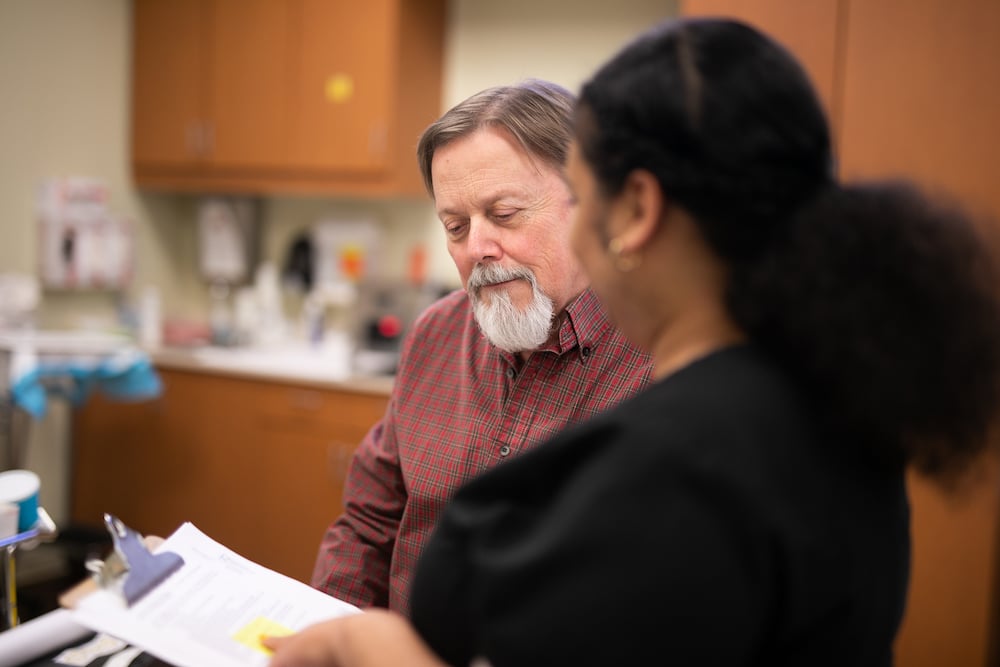
Lung cancer can come back, which is called a recurrence. This is something cancer patients often think about after they’re told that no more evidence of cancer can be found.
A lung cancer recurrence may develop if some of the lung cancer cells are left behind after treatment is complete. These could be undetectable at the time that the initial lung cancer treatments were completed and tests were run.
These remaining cells make the development of a new tumor possible. The tumor may not appear in the lungs, however. When lung cancer recurs, it may appear in the lungs or another area of the body. Even if the new tumor does not affect the lungs, it’s still referred to and treated as lung cancer.
How Likely is My Lung Cancer to Return?
The chances of recurring lung cancer depends on several factors. The type of cancer is the most significant factor and whether the cancer was small cell lung cancer (SCLC) or non-small cell lung cancer (NSCLC). Recurrence is also more likely if the cancer was fast-growing, more advanced, or more widespread at the initial diagnosis.
If you initially had non-small cell lung cancer, the rates of recurrence range dependent on stage.
- Stage 1 ranges from 5%-19%
- Stage 2 increases 11%-27%
- Stage 3 goes to 24%-40%
After successful treatment, recurrence can happen within six to eight months or within two years.
Most patients with small cell lung cancer, which is a more aggressive type of lung cancer, will have a lung cancer recurrence. This typically happens within 1-2 years of the first diagnosis.
In some cases the recurrent cancer can be treated into remission.
Where is Lung Cancer Most Likely to Recur?
Lung cancer can recur in three different ways:
- Local recurrence means it returns to the same area as the initial cancer. This would be in the lungs
- Regional recurrence means cancer has developed in the lymph nodes or other tissues surrounding the area of your initial cancer.
- Distant recurrence is lung cancer in a part of the body away from where the cancer initially developed, called metastatic cancer.
Fortunately, lung cancer recurrence typically happens in some key areas so your oncologists already know where to watch. These areas include:
- Brain
- Liver
- Bones
- Lymph Nodes
- Adrenal glands
- Nearby areas in the lung
The highest likelihood for recurrence of lung cancer is within the first five years. During this time, it is important to continue routine screening to catch any new or recurring cancer as early as possible. Don’t skip any of the follow up appointments or scans, and it’s best that you do not smoke.
Signs and Symptoms of Lung Cancer Recurrence
Recurring cancer symptoms depend on where the cancer is located. If it recurs in the lungs, you can have the same symptoms as your initial lung cancer, including:
- Cough that doesn’t go away or gets worse
- Coughing up blood or rust-colored spit
- Chest pain when you cough, laugh, or breathe deeply
- Shortness of breath or wheezing
- Hoarseness or trouble swallowing
Recurring lung cancer that develops elsewhere in the body can cause a variety of symptoms, such as:
- Lung cancer located in the bones that causes bone pain
- Lung cancer that has spread to the brain can cause headaches, seizures, dizziness, or loss of balance
- Lung cancer in the liver can cause a yellowing of the skin and/or eyes (jaundice)
- Lung cancer in lymph nodes can cause the nodes to swell or be tender when touched
Any of these symptoms are important to talk to your oncologist about. However, there are some patients who don’t have any symptoms when their lung cancer returns. That’s why going to your follow up appointments at the cancer center is important.
Recurring Cancer vs a Second Cancer
Recurring lung cancer is not the same as a second cancer, which develops after your initial cancer but is not related to it. A second cancer is a different type of cancer that develops in a different kind of cell. Having two primary cancers is very rare.
Lung cancer patients have an increased risk of developing one of these types of cancer as a second cancer:
- Different types of lung cancer
- Laryngeal cancer (voice box)
- Throat or mouth cancer
- Esophageal cancer
- Pancreatic cancer
- Bladder cancer
- Thyroid cancer
- Acute myeloid leukemia
Can Recurrent Lung Cancer be Prevented?
It is possible to reduce your risk of recurrent lung cancer by improving your health status, but there is no sure way to avoid it from coming back.
- Quit smoking if you haven’t already. Avoid all sources of secondhand smoke.
- Get regular exercise.
- Maintain a healthy weight.
- Eat a well-balanced diet rich in vegetables and fruits, lean protein sources, and whole grains. Avoid processed foods and high-sugar content foods and beverages like soft drinks.
- Stop or limit the amount of alcohol you consume.
Treatment Options for Recurrent Lung Cancer
How your oncologist treats recurrent lung cancer depends upon your overall health, the type of lung cancer and your treatment preferences. If biomarker testing has not already been performed for non-small cell lung cancer patients, it can be done now. Several targeted therapies are available for recurrent or metastatic non-small cell lung cancer that may not have been available during the first round of treatments.
Your treatment team may use radiation therapy, chemotherapy, surgery, targeted therapy, or immunotherapy to treat recurrent cancer.
Radiation therapy is one of the leading ways that doctors can help treat recurrent lung cancer. Radiation therapy can be used as part of a treatment plan, or as the primary means of attacking the cancer. Many patients utilize radiation therapy because it can target cancer cells in a larger area than traditional surgery or other targeted therapies. Additionally, radiation therapy can be used internally or externally depending on the patient’s needs.
Many types of recurring lung cancer can be slowed to provide a better quality of life. While it is disheartening to have cancer a second time, remember that you will have several essential advantages to fight cancer this time.
- Cancer treatment continues to improve, and you may have access to new therapies or a clinical trial.
- Patients with NSCLC have recently found success through the use of genetic testing and targeted therapies. These approaches have the ability to get a detailed understanding of the characteristics of your individual cancer and can help identify the best treatment approaches.
- You know more about fighting cancer than you did before, and you know how to deal with side effects.
- You’ve built relationships with your cancer care team.
- Ask for emotional support if depression and anxiety are interfering with your recovery.
If needed, the radiation oncologists at Radiotherapy Clinics of Georgia offer radiation therapies to help treat your lung cancer. If you would like more information, fill out the form to see if our doctors can help you today.



